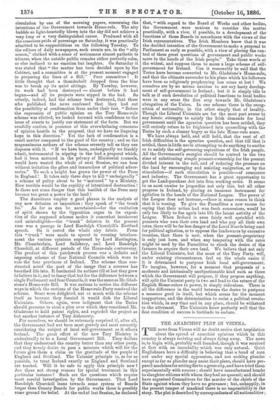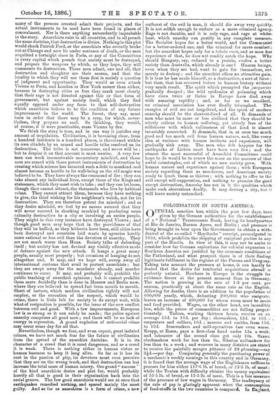THE ANARCHIST PLOT IN VIENNA.
THE news from Vienna will no doubt revive that trepidation about the spread of anarchist opinions which in this country is always reviving and always dying away. The news is, to begin with, probably well founded, though it was received at first with an incredulity which was only natural. Quiet Englishmen have a difficulty in believing that a band of men not under any special oppression, and not seeking plunder except so far as plunder may assist their plans, should have pre- pared machines for setting fire to a great city, and have tried them experimentally with success ; should have manufactured bombs to slaughter citizens with whom they had no quarrel; and should have organised Committees for the murder of the chiefs of the State against whom they have no grievance ; but, unhappily, in the present temper of mankind there is no impossibility in the story. The plot is described by correspondents of all nationalities ;
many of the persons arrested admit their projects, and the actual instruments to be used have been found in places of concealment. Nor is there anything antecedently improbable in the story. Anarchists exist in all countries, and in all preach the same doctrine, that destruction is divine. Nothing in this plot would shock Patrick Ford, or the anarchists who recently broke out at Chicago and now lie under sentence of death, or the men acquitted a fortnight since in Paris, or any of the Committees in every capital which preach that society must be destroyed, and prepare the weapons by which, as they hope, they will commence its destruction. These men admit, one and all, that destruction and slaughter are their means, and that the locality in which they will use them first is mainly a question of judgment and opportunity. They would as soon attack Vienna as Paris, and London or New York sooner than either, because in destroying cities so free they mark most clearly that their rage is not directed against this or that form of government, but against society itself, which they find equally opposed under any form to that self-destruction which anarchists believe to be the condition of any future improvement in the world. The forest, they say, must burn in order that there may be a crop, for which, never- theless, they prepare no seed. So thinking, they would, of course, if it were practicable, erase Vienna by fire.
We think the story is true, and in one way it justifies any amount of trepidation. Civilisation, it is becoming clear, from a hundred incidents in a hundred places, is threatened within its own citadels by an armed and hostile tribe resolved on its destruction. The tribe is not numerous, and never will be ; but to despise it on that account is most unwise. A very few men can work inconceivable momentary mischief, and these men are armed with those potent instruments of destruction by creating which science has incurred such a debt to mankind, and almost become as hostile to its well-being as the old magic was believed to be. They have always the command of fire ; they can take almost any individual lives, except those of the Kings and statesmen, which they most wish to take ; and they can let loose, though they cannot attract, the thousands who live by habitual crime. They cannot attract them, because they have nothing to give, the thief wishing for his neighbour's watch, not for its destruction. They are therefore potent for mischief ; and as they desire mischief, we feel by no means assured that they will never succeed in shocking mankind by producing some calamity destructive to a city or involving an entire people. They might in this very instance have destroyed Vienna ; and though good men may hope that in the providence of God they will be baffled, as they hitherto have been, still cities have been destroyed and countries laid waste by agencies hardly more rational or less evil than the devotees of anarchy. They are not much worse than Huns. Society talks of defending itself ; but society has not devised any visibly effective made of defence against the new attack. It hangs a great many people, usually most properly ; but occasions of hanging do not altogether end. It may, and we hope will, sweep away all international customs that avail to protect anarchists ; but they are swept away for the murderer already, and murder continues to occur. It may, and probably will, prohibit the public teaching of anarchist opinions ; but it cannot prohibit them more decidedly than is done in Moscow and Berlin now, where they are believed to spread fast from mouth to mouth. Short of torture, which modern civilisation rightly will not employ, or the execution of the suspect, which would be crime, there is little left for society to do except wait, with what of resignation is possible, for the issue of the new conflict between evil and good. With a few improvements, European law is as strong as it can safely be made ; the police against anarchy comprises all good men ; and there will be no lack of energy in repression. A grand explosion of anti-social crime may occur some day for all that.
Nevertheless, though we fear, and even expect, great isolated crimes, we have not much fear for the future of civilisation from the spread of the anarchist doctrine. It is in its character of a creed that it is most dangerous, and as a creed it is weak. There is nothing either in human virtue or human baseness to keep it long alive. So far as it has its root in the passion of pity, its devotees must soon perceive that they are on the wrong track, and that destruction can but increase the total mass of human misery. One grand" success" of the kind anarchists desire and plot for, would probably horrify all that is good in their organisation back into the social groove. The few good anarchists would see at once that earthquakes remedied nothing, and spared mainly the most guilty. And so far as anarchism is a form of crime, a new
outburst of the evil in man, it should die away very quickly. It is not selfish enough to endure as a mere criminal agency. Rage is not durable, and it is only rage, and rage at white- heat, which anarchy can gratify in any complete measure. The Socialist hopes for a better world, and the Communist for a better-ordered one, and the criminal for more comfort ; but the anarchist hopes only for a tabula rasa, and as man has experience of that, he does not readily catch the hope. Why should Hungary, say, reduced to a prairie, evolve a better society than Australia, which already is one ? Human beings, even when they are bad, want to gain for themselves, not merely to destroy ; and the anarchist offers no attractive gain. It is true he has made himself, as a destructive, a sort of force ; but then, that has occurred before in human history without very much result. The spirit which prompted the jac queries gradually decayed ; the wild epidemics of poisoning which have risen twice or thrice in Europe have died away with amazing rapidity ; and, so far as we recollect, no criminal association has ever finally triumphed. The energies of evil are not long-lived, and the spirit of modern anarchy should be the shortest-lived of all. It demands of. men who must be more or less civilised that they should. be utterly callous to human suffering, yet utterly free of the selfishness with which callousness of that kind is almost invariably connected. It demands, that is, at once too much good and too much evil from human nature, and, like every idea at variance with human instincts and experience, will gradually sink away. The men who felt happier far the earthquake of Lisbon must have been very few ; and the utmost the most successful of Anarchist Committees could hope to do would be to renew the scare on the morrow of that awful catastrophe, out of which no new society grew. With human nature and experience against them ; with European society regarding them as murderers, and American society ready to lynch them as thieves ; with nothing to offer to the evil except self-suppression, and nothing to promise the good except destruction, Anarchy has not in it the qualities which make such aberrations deadly. It may destroy a city, but it will leave society untouched.



































 Previous page
Previous page